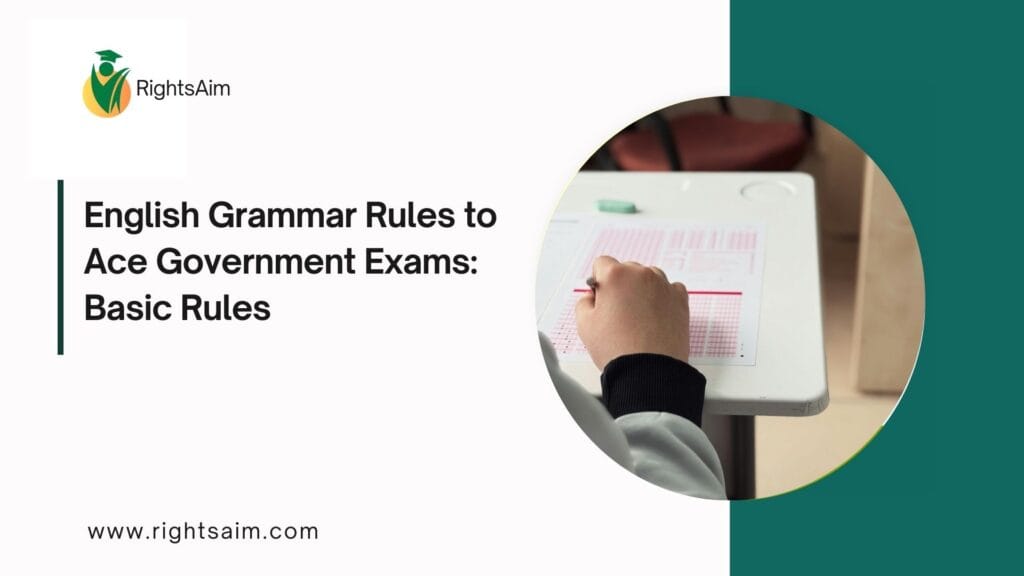English is a key section in almost every government exam — be it SSC CGL, CHSL, IBPS PO/Clerk, SBI exams, RBI, CDS, or State PCS. A good grasp of grammar rules not only helps in scoring high in Tier-1/Prelims but also improves descriptive writing for Mains and interviews. Many aspirants often find English tricky because of grammar-based errors. However, with consistent practice and focus on the basics, you can ace this section with ease.

1. Subject–Verb Agreement
The verb must always agree with the subject in number (singular/plural) and person.
Singular subject → Singular verb | Plural subject → Plural verb.
✅ Example:
He writes notes every day.
They write notes every day.
❌ Wrong: He write notes every day.
Exam Tip: SSC and Bank exams often test subject–verb agreement with collective nouns, indefinite pronouns, and plural forms.
2. Tenses
Tenses show the time of action. Candidates must understand the 12 forms of tense (Present, Past, Future → Indefinite, Continuous, Perfect, Perfect Continuous).
Consistency in tense use is critical.
✅ Example:
She is studying for her exam. (Present Continuous)
She studied hard yesterday. (Past Indefinite)
Exam Tip: In cloze tests and error spotting, questions often check tense sequence and proper usage.
3. Articles (a, an, the)
A/An: Used for singular countable nouns.
A → before consonant sounds, An → before vowel sounds.
The: Used for specific or previously mentioned nouns.
✅ Example:
He bought a book.
She saw an owl.
The sun rises in the east.
Exam Tip: Error spotting in SSC CGL/CHSL frequently tests article omission or misuse.
4. Prepositions
Prepositions show the relationship between words in a sentence (time, place, direction, cause, manner).
✅ Common rules:
We go to school.
He is interested in science.
She has been working here for two years.
Exam Tip: In government exams, prepositions are tested in fill-in-the-blank questions and phrase replacement.
5. Pronoun Rules
Pronouns must agree with their antecedents in number, gender, and person.
Avoid ambiguity in pronoun reference.
✅ Example:
Each of the girls must carry her bag.
Ram and I have completed our homework.
❌ Wrong: Each of the girls must carry their bag.
Exam Tip: Error detection and sentence improvement often check pronoun-antecedent consistency.
6. Adjectives & Adverbs
Adjectives qualify nouns/pronouns; adverbs qualify verbs, adjectives, or other adverbs.
Position matters: adjectives usually come before nouns, while adverbs may vary.
✅ Example:
She is a beautiful singer. (Adjective)
She sings beautifully. (Adverb)
Exam Tip: In sentence improvement questions, examiners test adjective vs adverb usage.
7. Active & Passive Voice
In Active Voice, the subject performs the action.
In Passive Voice, the subject receives the action.
✅ Example:
Active: The teacher explains the lesson.
Passive: The lesson is explained by the teacher.
Exam Tip: SSC exams often have 3–4 questions on changing voice.
8. Direct & Indirect Speech
Rules of changing speech involve changes in tense, pronouns, and time expressions.
✅ Example:
Direct: He said, “I am learning English.”
Indirect: He said that he was learning English.
Exam Tip: Frequently tested in SSC CGL, CDS, and Banking exams.
9. Conjunctions
Conjunctions connect words, phrases, or clauses.
Types: Coordinating, Subordinating, Correlative.
✅ Example:
I want tea and biscuits.
He will succeed because he works hard.
Exam Tip: Exams check correlative pairs like “either…or,” “neither…nor,” and conditional conjunctions.
10. Common Error Rules
Double negatives are incorrect: ❌ He didn’t do nothing. ✅ Correct: He didn’t do anything.
Misplaced modifiers cause confusion: ❌ Running quickly, the book fell. ✅ Running quickly, she dropped the book.
Parallelism must be maintained: ✅ She likes reading, writing, and painting.
How to Master Grammar for Exams
Learn through examples — rote memorization rarely works.
Practice PYQs — SSC, Banking, and CDS exams repeat question patterns.
Attempt mock tests with grammar-based sections.
Read newspapers like The Hindu or Indian Express for applied grammar.
Maintain a grammar notebook with rules + error examples.
Conclusion
English grammar plays a decisive role in government exams. While vocabulary and comprehension are important, solid grammar knowledge ensures accuracy in error spotting, sentence correction, and cloze test sections. Candidates who master rules of subject–verb agreement, tenses, articles, prepositions, pronouns, and voices consistently score higher.


